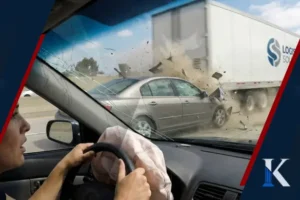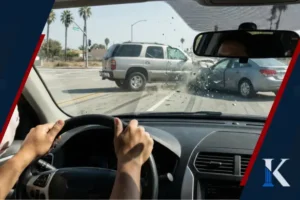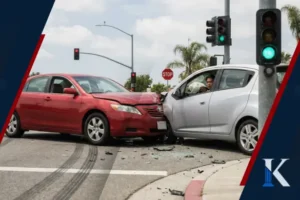
Accidents can lead to traumatic brain injuries (TBIs), which can be life-changing. This blog will simplify the various types of TBI resulting from car accidents and slip & fall incidents.
Understanding these types, their symptoms, prevention, and potential compensation is essential when dealing with such accidents.
Types of Traumatic Brain Injuries
Ano ang ibig sabihin ng TBI? TBI means Traumatic Brain Injury. This happens when your brain gets injured because of a strong hit to your head, causing problems with thinking, memory, or other brain functions.
The common types of TBI that can result from slip and fall and car accidents are:
Concussion
A concussion is a type of traumatic brain injury that happens when your head suddenly jerks, gets hit, or shakes. This kind of injury often occurs when someone takes a hard blow to the head, like in a football game, or due to the abrupt movement of the head, which can happen during car accidents.
Concussions can range from mild to severe, and sometimes people don’t realize they have a concussion until a healthcare provider examines them.
Doctors usually diagnose concussions by doing a neurological check, which involves testing your reflexes, coordination, vision, hearing, and balance. They may also give you a cognitive test to check your memory, concentration, and ability to recall information. If these tests don’t provide a clear answer, the doctor might recommend a brain imaging test like a cranial computerized tomography (CT) scan.
Symptoms may include:
- Mild Concussion: Temporary confusion, dizziness, blurred vision
- Moderate Concussion: More severe cognitive issues
- Severe Concussion: Significant cognitive impairment or altered mental status
Car accidents often cause concussions, ranging from mild to severe, affecting the brain’s function.
Brain Contusion
The second common type of traumatic brain injury is called a brain contusion. A brain contusion happens when the brain itself gets bruised in an accident or injury. Bruising occurs when blood vessels break, and when it involves the brain, it’s a serious matter. Blood clots in the brain, known as hematomas, can put pressure on the brain, leading to increased intracranial pressure.
Brain contusions typically occur when there’s a direct impact to the head, like when someone’s head hits the dashboard or steering wheel during a car accident if they’re not wearing a seatbelt. Since brain contusions directly harm the brain’s structure, they are more severe than concussions.
Common types are:
- Coup Contusion: Impact on the brain’s surface.
- Contrecoup Contusion: Opposite side impact.
Contusions can grow larger hours or even days after the injury, leading to a decline in brain function. If a contusion causes bleeding or swelling in the brain, it’s considered severe, and surgery may be necessary. Symptoms of brain contusions vary depending on their seriousness. Common signs include confusion, drowsiness, difficulty with balance and coordination, seizures, and problems with hearing and slurred speech.
Diffuse Axonal Injury (DAI)
Diffuse Axonal Injury (DAI) is a type of brain injury that occurs when there is widespread damage to nerve fibers in the brain. Unlike other TBIs that may focus on one area, DAI affects multiple regions of the brain. This severe injury happens when the head undergoes sudden and severe acceleration or deceleration, which causes the brain to shift or rotate inside the skull.
The stretching and tearing of nerve fibers in DAI disrupt the brain’s normal communication and functioning. It can result from various accidents, such as high-speed car crashes or severe falls, where the head experiences rapid and forceful movement.
The severity of DAI can range from mild to severe, and its symptoms may include:
- Loss of consciousness
- Confusion
- Loss of memory
- Coma and death
Diagnosing DAI typically involves brain imaging techniques like CT scans or MRIs, as it may not always be immediately apparent.
Recovery from DAI can be challenging and may require extensive rehabilitation and medical care. The outcome depends on the extent of the injury, and some individuals may experience long-term cognitive and physical impairments. Early medical intervention and appropriate treatment are crucial for improving the chances of recovery in cases of diffuse axonal injury.
Penetrating Injury
A penetrating brain injury is also one of the common types of TBI after car accidents. It is when an object, such as a bullet, a sharp object, or bone fragments from a skull fracture, pierces through the skull and enters the brain tissue. These injuries are often the result of violent incidents, gunshot wounds, or accidents where objects penetrate the head.
One common element of penetrating brain injuries is that they involve not only damage to the brain tissue but also a breach of the protective skull barrier. This is often due to the tremendous force or velocity with which the penetrating object enters the head.
Skull fractures are frequently associated with penetrating brain injuries. When a penetrating object strikes the skull, it can cause the skull bone to break or shatter, creating an entry point for the object to reach the brain. The combination of the penetrating object and the fractured skull can lead to severe damage and complications.
The severity of penetrating brain injuries can vary widely, depending on factors such as the size and trajectory of the penetrating object and the brain regions affected. These injuries can result in a range of symptoms, such as:
- Localized neurological deficits
- Loss of consciousness
- Coma in severe head injuries
When someone has a penetrating brain injury, the usual treatment often starts with emergency surgery. During this surgery, doctors try to remove any foreign objects, fix the broken part of the skull, and take care of any bleeding or swelling inside the brain.
The outcome in the long run for people with penetrating brain injuries depends on how much damage was done and how well the medical treatment worked. Many times, recovering from these injuries means going through rehabilitation and getting regular medical care. This helps with physical and cognitive problems that might happen because of the injury.
Second Impact Syndrome
Second impact syndrome is a kind of brain injury that happens when a person gets a secondary injury shortly after the first one. For instance, if an athlete goes back to playing too soon after a concussion and gets hit in the head again, they might suffer from second impact syndrome (SIS). What makes SIS really concerning is that even a minor impact during the second concussion can cause lasting brain damage. This is because the brain becomes more delicate after the first concussion.
After the second concussion, the brain can swell quickly, leading to various symptoms that can range from mild to very serious. Common symptoms include:
- Loss of consciousness
- Trouble moving the eyes
- Difficulty breathing
- Dilated pupils
- Confusion
- Problems with speech
- Issues with coordination and balance
If someone thinks they might have second impact syndrome, it’s super important to get medical help right away. A doctor will usually do a CT scan to check how much bleeding or swelling is happening in the brain. Treating this injury often involves going to the hospital and being closely watched by medical experts. Sometimes, treatments like diuresis, blood pressure control, hyperventilation, and fluid restriction might be needed to manage the condition effectively and prevent permanent brain damage.
Long-Term Impact on Mental and Overall Health
Traumatic brain injuries (TBIs) can have lasting effects on your mental and overall health. This means that even after the initial injury, there can be ongoing challenges. These challenges often include:
- Depression: Feeling down or sad for a long time.
- Anxiety: Experiencing excessive worry or nervousness.
- Cognitive Impairment: Having trouble with thinking, memory, and other mental abilities.
To effectively deal with these challenges, it’s crucial to get help from healthcare professionals. They can provide the right support and treatment.
Rehabilitation and Treatment Options
Rehabilitation is a significant part of recovering from a TBI. This means going through various types of treatment to help you get better. These treatments may include:
- Physical Therapy: Exercises and activities to improve your physical abilities.
- Speech Therapy: Help with speaking and communication difficulties.
- Cognitive Rehabilitation: Training to enhance your thinking and memory skills.
All of these treatments are designed to address different aspects of the injury and help you regain your abilities.
Possible Compensation
If you or someone you care about has experienced a TBI because of someone else’s actions or negligence, it’s essential to consider seeking compensation. This means getting the financial support you deserve to cover medical bills and other costs related to the injury.
To navigate this process, it’s a good idea to consult with a skilled lawyer who specializes in these types of cases. They can guide you through the legal complexities and ensure that you receive the compensation you need to move forward.
FAQs About Types of TBI
How can I prevent TBI in car accidents?
Always wear a seatbelt and follow traffic rules.
What should I do if I suspect someone has a TBI after a slip and fall?
Avoid moving the person unnecessarily and seek immediate medical help.
Is it possible for symptoms of traumatic brain injuries from falls or car accidents to show up days after an accident?
Indeed, some symptoms might not become apparent right away, so it’s important to keep a close watch. This includes being aware of the possibility of memory loss or other TBI-related issues that could surface later on.
I may have a mild TBI. Is this type of injury visible on imaging scans?
No, some mild TBIs may not show on scans, emphasizing the need for medical evaluation.
How long does it take to recover from a TBI?
Recovery varies based on severity, from weeks to years or lifelong challenges.
Can a Filipino-Speaking Lawyer Help?
Understanding the types of brain injury, their causes, and the potential compensation avenues is crucial for those affected by motor vehicle accidents and slip & fall incidents. Moreover, navigating the aftermath of a TBI can be challenging, especially for the Filipino community in California. Having access to a lawyer who speaks Filipino can bridge the communication gap and provide culturally sensitive assistance.Seeking help from support groups, local communities like Kapwa Justice, or from a lawyer who understands your language and culture can also make a significant difference in your journey to recovery and justice. They understand the unique needs of the Filipino community and can help you pursue the compensation required for recovery and rehabilitation.




